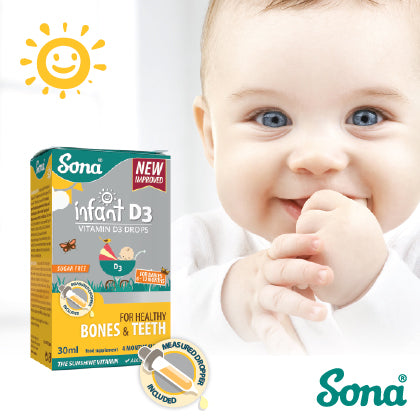
Vitamin D is important for babies to ensure healthy growth and development. Babies who do not receive enough vitamin D become at risk of developing rickets, a disease that affects the way bones grow and develop. Once rare, this disease has re-emerged in children in recent years causing concern. Giving your baby a daily vitamin D supplement will help ensure that your baby is receiving the recommended intake.
In this article you can find:
- What is vitamin D?
- Do all babies need to be given a vitamin D supplement?
- What are the other benefits of vitamin D as baby grows?
What is vitamin D?
Vitamin D is a type of fat-soluble vitamin. Fat-soluble vitamins refer to the vitamins that are absorbed along with fats in the diet and can be stored in the body's fatty tissue. Vitamin D plays a key role in numerous important bodily processes. This includes helping the body absorb other nutrients, ensuring that muscles and bones work efficiently, regulating neurotransmitter synthesis, helping to support the immune system, supporting heart health, as well as regulating insulin levels.
Do all babies need to be given a vitamin D supplement?
It is recommended that all babies are given 200 IU/day of vitamin D, year-round, to ensure adequate levels. Babies who are more at risk of deficiency may need to receive a higher dose vitamin D each day. This includes:
- Breastfed babies whose mothers do not have enough vitamin D
- Babies who have a dark skin tone (greater amounts of the pigment melanin in the skin lessen the ability of the skin to absorb UV rays for vitamin D production)
- Babies whose skin is covered with clothing or sunscreen much of the time
- Babies who live in areas that reduce direct sunlight (cities with tall buildings)
- Babies who live in colder climates (northern communities)
Sona Infant D3 is a specially formulated Vitamin D3 supplement for infants ages 0 -12 months, providing the recommended 5μg (200 IU) of Vitamin D in each daily dose. A measured dropper is included in each pack for accurate dosing. Each bottle contains 4 months’ supply of Vitamin D.
What are the other benefits of vitamin D as baby grows?
We all want to set our babies up for a healthy future, so what happens after 12 months old? The answer is that most of us will still benefit from a supplement for these reasons:
- Bone and muscle health: Muscles and bones are continuously being restructured through mineralization (the process of deposition of minerals on the bone matrix). Vitamin D plays a fundamental role in this process by helping the body regulate the absorption of phosphorus and calcium within the body, two compounds that provide density and strength to muscles and bones.
- Mental health: Vitamin D is involved in regulating neurotransmitter synthesis. Serotonin, the key hormone that stabilizes our mood, feelings of well-being, and happiness, rises when exposed to bright light and falls with decreased exposure. Research has shown that increasing levels of vitamin D overtime could effectively help to reduce the symptoms of anxiety, depression, as well as other mood disorders.
- Heart health: Various studies have indicated that those with high blood pressure experienced a drop in numbers when vitamin D levels were increased. Vitamin D3 actively reduces the concentration of renin, an enzyme secreted by the kidney that influences blood vessels. In turn, improving cardiovascular endurance and keeping heart muscle cells from growing too large.
- Immune function: Vitamin D has also been found to have a significant effect on the body’s immune system. Vitamin D boosts the pathogen-fighting abilities of monocytes and macrophages (white blood cells that play a key role in immune protection), and helps reduce inflammation, which aids immunological response.
- Insulin control: Vitamin D helps regulate blood sugar levels by activating the pancreas in which triggers the process of insulin production. Vitamin D has even shown effective in decreasing insulin sensitivity in pre-diabetic patients.
References
- EHRLICH, G. (2010). Sunshine and Vitamin D. A Comprehensive Guide to the Benefits of the “Sunshine Vitamin”. The Journal Of Rheumatology, 37(2), 475-475. doi: 10.3899/jrheum.091173.
- Tan, M., Abrams, S., & Osborn, D. (2018). Vitamin D supplementation for term breastfed infants to prevent vitamin D deficiency and improve bone health. Cochrane Database Of Systematic Reviews. doi: 10.1002/14651858.cd013046.
- Tanner, S., & Harwell, S. (2015). More than healthy bones: a review of vitamin D in muscle health. Therapeutic Advances In Musculoskeletal Disease, 7(4), 152-159. doi: 10.1177/1759720x15588521.
- Sahay, M., & Sahay, R. (2012). Rickets-vitamin D deficiency and dependency. Indian Journal Of Endocrinology And Metabolism, 16(2), 164. doi: 10.4103/2230-8210.93732.
- Vitamins and minerals - Vitamin D. (2021). Retrieved 14 July 2021, from https://www.nhs.uk/conditions/vitamins-and-minerals/vitamin-d/.
- Vitamin D for babies 0 to 12 months. (2021). Retrieved 21 July 2021, from https://www2.hse.ie/wellbeing/child-health/vitamin-d-for-babies-0-12-months.html.
